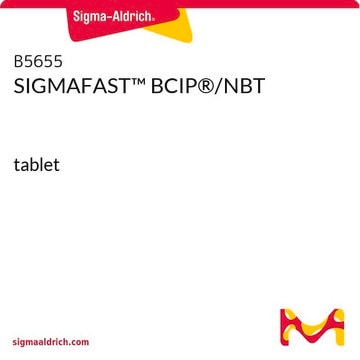V9505
Monoclonal Anti-Vitamin B12 antibody produced in mouse
clone CD-29, ascites fluid
Synonym(s):
Anti-Cyanocobalamin
Sign Into View Organizational & Contract Pricing
All Photos(1)
About This Item
Recommended Products
biological source
mouse
Quality Level
conjugate
unconjugated
antibody form
ascites fluid
antibody product type
primary antibodies
clone
CD-29, monoclonal
contains
15 mM sodium azide
technique(s)
indirect ELISA: 1:5,000
isotype
IgG1
shipped in
dry ice
storage temp.
−20°C
target post-translational modification
unmodified
General description
Monoclonal Anti-Vitamin B12 antibody reacts with vitamin B12, as well as with vitamin B12-KLH and vitamin B12-BSA conjugates in human plasma and serum.
Vitamin B12 or cobalamin is a water-soluble vitamin. It is the largest and most complex among all the vitamins. Vitamin B12 is naturally found in animal foods, meat, milk, egg, fish and shellfish.
Application
Monoclonal Anti-Vitamin (B12) antibody has been used in enzyme linked immunosorbent assay (ELISA)
Monoclonal Anti-Vitamin B12 antibody produced in mouse has also been used in immunocytochemistry.
Biochem/physiol Actions
Vitamin B12 serves as a cofactor for methionine synthase and L-methylmalonyl−coenzyme A mutase. It is essential for the maintenance and development of CNS. Vitamin B12 deficiency leads to megaloblastic anemia and neuropathy.
Vitamin B12 regulates genomic stability. While increased levels of vitamin B12 have been associated with hepatic and hematological disorders; cobalamin deficiency has been associated with orthostatic hypotension and depression . The antibody also detects coenzyme B12 and methyl vitamin B12, but does not associate with BSA, folic acid, and 5-methyltetrahyrofolic acid.
Vitamin B12 and folic acid can be used for treating disorders of central nervous system (CNS) development, mood, and cognitive decline, including some dementias.
Disclaimer
Unless otherwise stated in our catalog or other company documentation accompanying the product(s), our products are intended for research use only and are not to be used for any other purpose, which includes but is not limited to, unauthorized commercial uses, in vitro diagnostic uses, ex vivo or in vivo therapeutic uses or any type of consumption or application to humans or animals.
Not finding the right product?
Try our Product Selector Tool.
Storage Class Code
12 - Non Combustible Liquids
WGK
WGK 2
Flash Point(F)
Not applicable
Flash Point(C)
Not applicable
Certificates of Analysis (COA)
Search for Certificates of Analysis (COA) by entering the products Lot/Batch Number. Lot and Batch Numbers can be found on a product’s label following the words ‘Lot’ or ‘Batch’.
Already Own This Product?
Find documentation for the products that you have recently purchased in the Document Library.
A A M Ermens et al.
Clinical biochemistry, 36(8), 585-590 (2003-11-26)
Elevated levels of serum cobalamin may be a sign of a serious, even life-threatening, disease. Hematologic disorders like chronic myelogeneous leukemia, promyelocytic leukemia, polycythemia vera and also the hypereosinophilic syndrome can result in elevated levels of cobalamin. Not surprisingly, a
Fumio Watanabe
Experimental biology and medicine (Maywood, N.J.), 232(10), 1266-1274 (2007-10-26)
The usual dietary sources of vitamin B(12) are animal foods, meat, milk, egg, fish, and shellfish. As the intrinsic factor-mediated intestinal absorption system is estimated to be saturated at about 1.5-2.0 microg per meal under physiologic conditions, vitamin B(12) bioavailability
M Fenech
Mutation research, 475(1-2), 57-67 (2001-04-11)
Folic acid plays a critical role in the prevention of chromosome breakage and hypomethylation of DNA. This activity is compromised when Vitamin B12 (B12) concentration is low because methionine synthase activity is reduced, lowering the concentration of S-adenosyl methionine (SAM)
Christine M Pfeiffer et al.
The Journal of nutrition, 143(6), 957S-965S (2013-04-12)
Biochemical indicators of water-soluble vitamin (WSV) status were measured in a nationally representative sample of the U.S. population in NHANES 2003-2006. To examine whether demographic differentials in nutritional status were related to and confounded by certain variables, we assessed the
Henrik Birn et al.
American journal of physiology. Renal physiology, 282(3), F408-F416 (2002-02-08)
Megalin has previously been shown to bind and mediate endocytosis of transcobalamin (TC)-B(12). However, the physiological significance of this has not been established, and other TC-B(12) binding proteins have been suggested to mediate renal uptake of this vitamin complex. The
Our team of scientists has experience in all areas of research including Life Science, Material Science, Chemical Synthesis, Chromatography, Analytical and many others.
Contact Technical Service








